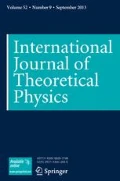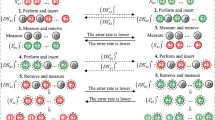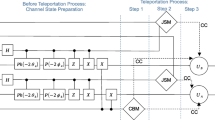Abstract
We first propose a three-party semi-quantum summation protocol with an almost-dishonest third party (TP) using single photons. TP who has full quantum power helps three classical users compute the summation of their private bit strings while the privacy of their inputs is preserved. For a particle from TP, three users’ operations are limited either to (1) reflect the particle without disturbance back to TP or to (2) measure the particle in the Z basis and resend the measured particle back to TP. We also show that our protocol is secure against both outside and participant attacks.
Similar content being viewed by others
References
Heinrich, S.: Quantum summation with an application to integration. J. Complex. 18(1), 1–50 (2002)
Heinrich, S., Novak, E.: On a problem in quantum summation. J. Complex. 19(1), 1–18 (2003)
Heinrich, S., Kwas, M., Wozniakowski, H.: Quantum boolean summation with repetitions in the worst-average setting. arXiv:quant-ph/0311036 (2003)
Du, J. Z., Chen, X. B., Wen, Q. Y., Zhu, F. C.: Secure multiparty quantum summation. Acta Phys. Sin. 56(11), 6214 (2007)
Chen, X. B., Xu, G., Yang, Y. X., Wen, Q. Y.: An efficient protocol for the secure multi-party quantum summation. Int. J. Theo. Phy. 49(11), 2793–2804 (2010)
Lo, H. K.: Insecurity of quantum secure computations. Phys. Rev. A 56, 1154–1162 (1997)
Crépeau, C., Gottesman, D., Smith, A.: Secure multi-party quantum computation. In: Proceedings of the Thiry-Fourth Annual ACM Symposium on Theory of Computing, pp 643–652. ACM (2002)
Chau, H. F.: Quantum-classical complexity-security tradeoff in secure multiparty computations. Phys. Rev. A 61, 032308 (2000)
Ben-Or, M., Crepeau, C., Gottesman, D., Hassidim, A., Smith, A.: Secure multiparty quantum computation with (only) a strict honest majority. In: 47th Annual IEEE Symposium on Foundations of Computer Science, 2006. FOCS’06, pp 249–260 (2006)
Smith, A.: Multi-party quantum computation. arXiv:quant-ph/0111030 (2010)
Sun, Z., Yu, J., Wang, P., Xu, L., Wu, C.: Quantum private comparison with a malicious third party. Quantum Inf. Process 14(6), 2125–2133 (2015)
Hung, S. M., Hwang, S. L., Hwang, T., Kao, S. H.: Multiparty quantum private comparison with almost dishonest third parties for strangers. Quantum Inf. Process 16(2), 36 (2017)
He, G.P.: Quantum private comparison protocol without a third party. Int. J. Quantum Inf. 15(02), 1750014 (2017)
Hillery, M., Ziman, M., Bužek, V., Bieliková, M.: Towards quantum-based privacy and voting. Phys. Lett. A 349(1-4), 75–81 (2006)
Li, Y., Zeng, G.: Quantum anonymous voting systems based on entangled state. Optical Review 15(5), 219–223 (2008)
Wang, Q., Yu, C., Gao, F., Qi, H., Wen, Q.: Self-tallying quantum anonymous voting. Phys. Rev. A 94(2), 022333 (2016)
Xue, P., Zhang, X.: A simple quantum voting scheme with multi-qubit entanglement. Scientific Reports 7(1), 7586 (2017)
Bao, N., Halpern, N.Y.: Quantum voting and violation of arrow’s impossibility theorem. Phys. Rev. A 95(6), 062306 (2017)
Zhang, C., Sun, Z., Huang, Y., Long, D.: High-capacity quantum summation with single photons in both polarization and spatial-mode degrees of freedom. Int. J. Theor. Phys. 53(3), 933–941 (2014)
Zhang, C., Sun, Z.W., Huang, X., Long, D.Y.: Three-party quantum summation without a trusted third party. Int. J. Quantum Inf. 13(02), 1550011 (2015)
Shi, R. H., Mu, Y., Zhong, H., Cui, J., Zhang, S.: Secure multiparty quantum computation for summation and multiplication. Sci. Rep. 6, 19655 (2016)
Shi, R. H., Zhang, S.: Quantum solution to a class of two-party private summation problems. Quantum Inf. Process 16(9), 225 (2017)
Zhang, C., Situ, H., Huang, Q., Yang, P.: Multi-party quantum summation without a trusted third party based on single particles. Int. J. Quantum Inf.: 1750010 (2017)
Liu, W., Wang, Y. B., Fan, W. Q.: An novel protocol for the quantum secure multi-party summation based on two-particle bell states. Int. J. Theor. Phys. 56(9), 2783–2791 (2017)
Yang, H. Y., Ye, T. Y.: Secure multi-party quantum summation based on quantum fourier transform. Quantum Inf. Process 17(6), 129 (2018)
Ji, Z., Zhang, H., Wang, H., Wu, F., Jia, J., Wu, W.: Quantum protocols for secure multi-party summation. Quantum Inf. Process 18(6), 168 (2019)
Julsgaard, B., Sherson, J., Cirac, J. I., Fiurášek, J., Polzik, E.S.: Experimental demonstration of quantum memory for light. Nature 432 (7016), 482 (2004)
Yao, X. C., Wang, T. X., Xu, P., Lu, H., Pan, G. S., Bao, X. H., Peng, C. Z., Lu, C. Y., Chen, Y. A., Pan, J. W.: Observation of eight-photon entanglement. Nature Photonics 6(4), 225 (2012)
Nielson, M. A., Chuang, I.L.: Quantum computation and quantum information (2000)
Boyer, M., Kenigsberg, D., Mor, T.: Quantum key distribution with classical bob. In: 2007 First International Conference on Quantum, Nano, and Micro Technologies (ICQNM’07), pp 10–10. IEEE (2007)
Zou, X., Qiu, D., Li, L., Wu, L., Li, L.: Semiquantum-key distribution using less than four quantum states. Phy. Rev. A 79(5), 052312 (2009)
Jian, W., Sheng, Z., Quan, Z., Chao-Jing, T.: Semiquantum key distribution using entangled states. Chinese Phys. Lett. 28(10), 100301 (2011)
Krawec, W.O.: Mediated semiquantum key distribution. Phys. Rev. A 91(3), 032323 (2015)
Li, Q., Chan, W. H., Zhang, S.: Semiquantum key distribution with secure delegated quantum computation. Scientific Reports 6, 19898 (2016)
Liu, Z.R., Hwang, T.: Mediated semi-quantum key distribution without invoking quantum measurement. Annalen der Physik 530(4), 1700206 (2018)
Li, Q., Chan, W.H., Long, D.Y.: Semiquantum secret sharing using entangled states. Phys. Rev. A 82, 022303 (2010)
Wang, J., Zhang, S., Zhang, Q., Tang, C.J.: Semiquantum secret sharing using two-particle entangled state. Int. J. Quantum Inf. 10(05), 1250050 (2012)
Li, L., Qiu, D., Mateus, P.: Quantum secret sharing with classical bobs. J. Phys. A: Mathematical and Theoretical 46(4), 045304 (2013)
Yang, C.W., Hwang, T.: Efficient key construction on semi-quantum secret sharing protocols. Int. J. Quantum Inf. 11(05), 1350052 (2013)
Chou, W. H., Hwang, T., Gu, J.: Semi-quantum private comparison protocol under an almost-dishonest third party. arXiv:1607.07961 (2016)
Yan-Feng, L.: Semi-quantum private comparison using single photons. Int. J. Theor. Phys. 57(10), 3048–3055 (2018)
Lin, P. H., Hwang, T., Tsai, C. W.: Efficient semi-quantum private comparison using single photons. Quantum Inf. Process 18(7), 207 (2019)
Shukla, C., Thapliyal, K., Pathak, A.: Semi-quantum communication: protocols for key agreement, controlled secure direct communication and dialogue. Quantum Inf. Process 16(12), 295 (2017)
Dür, W., Vidal, G., Cirac, J.I.: Three qubits can be entangled in two inequivalent ways. Phys. Rev. A 62(6), 062314 (2000)
Cai, Q. Y.: Eavesdropping on the two-way quantum communication protocols with invisible photons. Phys. Lett. A 351(1-2), 23–25 (2006)
Kraus, B., Tittel, W., Gisin, N., Nilsson, M., Kröll, S., Cirac, J.: Quantum memory for nonstationary light fields based on controlled reversible inhomogeneous broadening. Phys. Rev. A 73(2), 020302 (2006)
Deng, F.G., Li, X.H., Zhou, H.Y., Zhang, Z.J.: Improving the security of multiparty quantum secret sharing against trojan horse attack. Phys. Rev. A 72(4), 044302 (2005)
Li, X.H., Deng, F.G., Zhou, H.Y.: Improving the security of secure direct communication based on the secret transmitting order of particles. Phys. Rev. A 74(5), 054302 (2006)
Gu, J., Ho, C. Y., Hwang, T.: Statistics attack on ’quantum private comparison with a malicious third party’and its improvement. Quantum Inf. Process 17(2), 23 (2018)
Acknowledgements
This work is supported by the National Natural Science Foundation of China (Grant Nos. 61902132, 11647140, and 61872152), the Guangdong Basic and Applied Basic Research Foundation (Grant No. 2021A1515011985), the Natural Science Foundation of Guangdong Province of China (Grant No. 2018A030310147), the Shenzhen Polytechnic Youth Innovation Project (Grant Nos. 6019310010K0 and 6019310007K0), and the Shenzhen Technical Project (No. JCYJ20190809152003992).
Author information
Authors and Affiliations
Corresponding author
Additional information
Publisher’s Note
Springer Nature remains neutral with regard to jurisdictional claims in published maps and institutional affiliations.
Rights and permissions
About this article
Cite this article
Zhang, C., Huang, Q., Long, Y. et al. Secure Three-Party Semi-quantum Summation Using Single Photons. Int J Theor Phys 60, 3478–3487 (2021). https://doi.org/10.1007/s10773-021-04921-x
Received:
Accepted:
Published:
Issue Date:
DOI: https://doi.org/10.1007/s10773-021-04921-x




